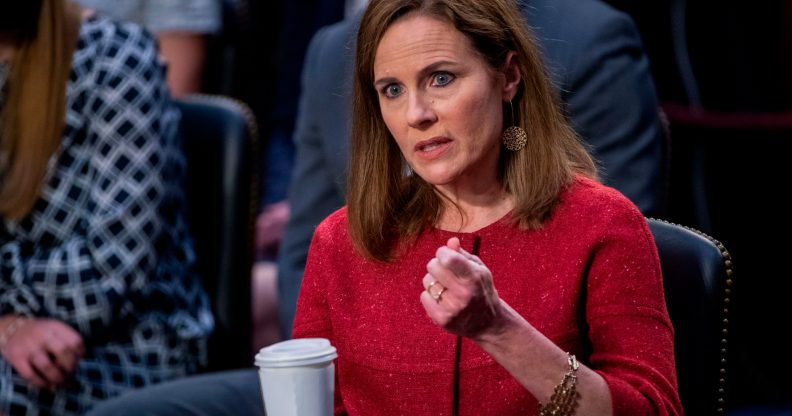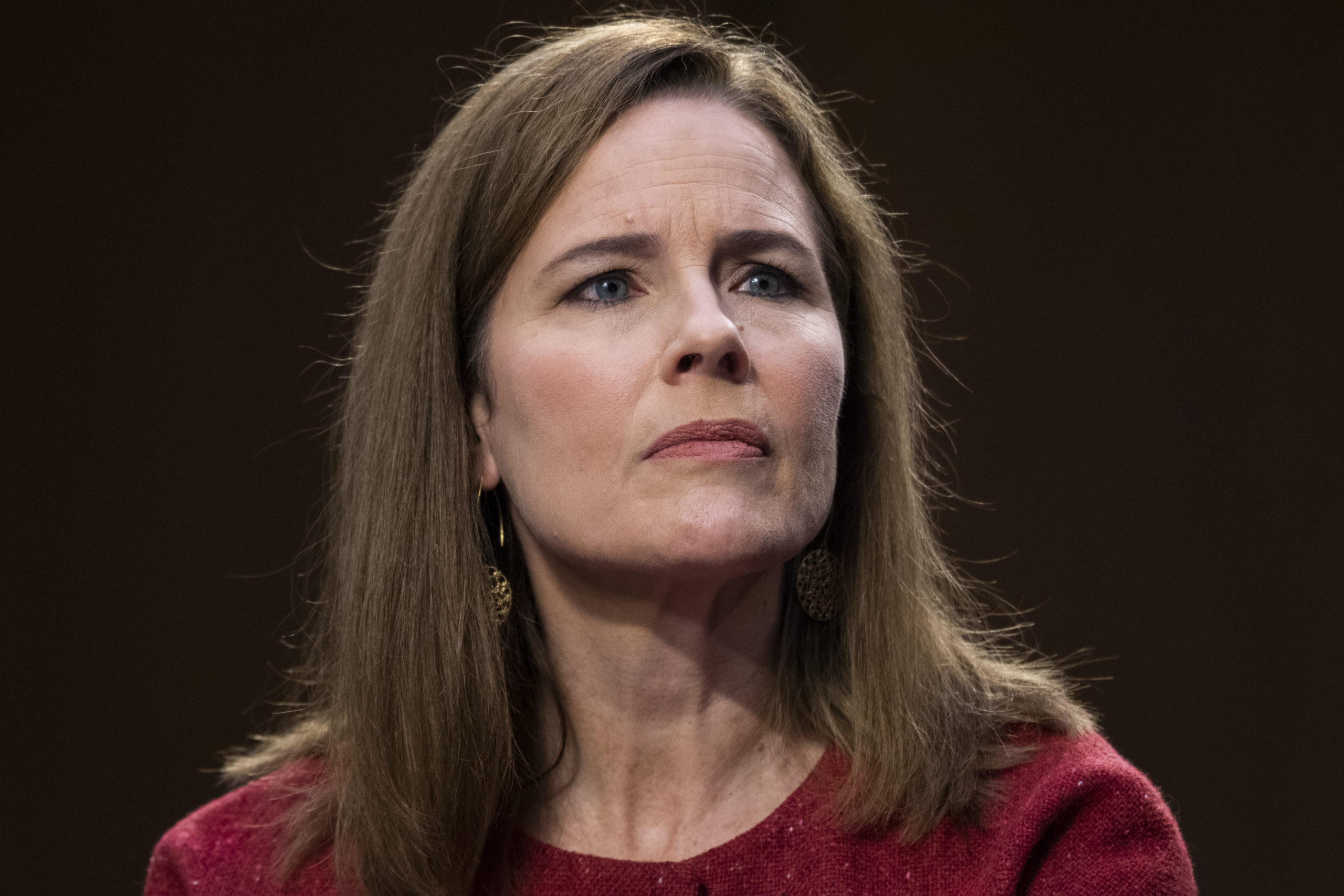Supreme Court nominee Amy Coney Barrett pleads ignorance over extensive ties to anti-LGBT+ hate group

Supreme Court nominee Judge Amy Coney Barrett speaks during her confirmation hearing before the Senate Judiciary Committee on Capitol Hill in Washington, DC (SHAWN THEW/POOL/AFP via Getty)
Donald Trump’s Supreme Court nominee Amy Coney Barrett has refused to say whether she would vote to roll back key LGBT+ rights rulings and plead ignorance over her extensive ties with an anti-LGBT+ hate group.
The controversial conservative nominee is expected to overturn the court’s already-fragile 5-4 consensus on LGBT+ issues if confirmed to replace liberal stalwart Ruth Bader Ginsburg.
At her confirmation hearing on Tuesday (13 October), Barrett was scrutinised by Democratic senator Patrick Leahy over her ties to Alliance Defending Freedom – a listed anti-LGBT+ hate group that has brought countless cases seeking to undermine LGBT+ discrimination protections, as well as leading efforts internationally to oppose the decriminalisation of homosexuality.
Amy Coney Barrett claimed she wasn’t aware of listed anti-LGBT+ hate group’s anti-LGBT+ views
Barrett was a paid speaker five times, starting in 2011, at the Blackstone Legal Fellowship, a summer program run by the group.
Asked if she was aware of ADF’s work advocating the criminalisation of gay sex when she undertook the series of lectures, Barrett claimed: “I was not aware of those efforts, no.”
Leahy noted that the reading materials for the programme detailed ADF’s 2003 brief defending state sodomy laws that banned gay sex, which had argued “same-sex sodomy is a distinct public health problem”.
Barrett claimed she had never seen any information about the group’s homophobic views, responding: “My experience with the Blackstone Programme was a wonderful one, it gathers the best and brightest Christian law students from around the country. I gave a one-hour lecture on originalism.
“I didn’t read all the material that the students were given to read, that had nothing to do with my lecture. I enjoyed teaching the students about what my specialty was, which is constitutional law, and nothing about my interactions with anyone involved in the programme were ever indicative of discrimination of discrimination on the basis of anything.”
However, even the briefest of Google searches of Alliance Defending Freedom underlines the group’s clear anti-LGBT+ animus, with its website boasting of its work to “defend marriage policies that give children the opportunity to have a married mother and father”.

Supreme Court justice nominee Amy Coney Barrett testifies on the second day of her Senate Judiciary Committee confirmation hearing. (Tom Williams/CQ-Roll Call, Inc via Getty Images)
Responding to the evasive answer, Human Rights Campaign said: “Coney Barrett has held close ties with anti-LGBT+ hate group the Alliance Defending Freedom, participating in numerous speaking engagements with the group and even having its leader join her Rose Garden super-spreader nomination party. ADF’s history of anti-LGBT+ rhetoric and actions is among the most horrific of any group operating in the United States.”
HRC noted that the group Alliance Defending Freedom has advocated for the sterilisation of trans people, represented the funeral home, represented a funeral home that argued it is legal to fire employees for being transgender, and has supported efforts to criminalise homosexuality in India, Jamaica and Belize.
Supreme Court nominee ducks questions over equal marriage.
Barrett was also scrutinised by Democratic committee member Dianne Feinstein over her public pledge to decide cases in the mould of the late justice Antonin Scalia – who dissented against every single pro-LGBT+ ruling during his time on the court, from the decriminalisation of homosexuality to the introduction of same-sex marriage.
Despite explicitly aligning herself with Scalia’s views previously, Barrett refused to say whether she agreed with his assessment that “the US constitution does not afford gay people the fundamental right to marry”.
She said: “If I were confirmed, you would be getting justice Barrett, not justice Scalia. I don’t think that anybody should assume that just because justice Scalia would decide a decision a certain way, that I would too – but I’m not going to express a view on whether I agree or disagree with justice Scalia [on same-sex marriage].”
Barrett cited the practise of Supreme Court nominees to give “no hints, no previews, no forecasts” of how they would rule on issues, saying: “I’m sorry not to be able to embrace or disavow justice Scalia’s position, but I really can’t do that on any point of law.”
The evasiveness comes despite Barrett’s public signing of a 2015 letter stating her support for “marriage and family founded on the indissoluble commitment of a man and a woman”.
Feinstein picked on the evasive answer, responding: “That’s really too bad, because it’s rather a fundamental point for large numbers of people in this country. I understand you don’t want to answer these questions directly, but you identify yourself with the justice [and there are concerns] that you, like him, would be a consistent vote to roll back hard-fought freedoms and protections for the LGBT+ community.
“What I was hoping you would say is that this would be a point of difference, where those freedoms would be respected, and you haven’t said that.”
Barrett replied: “Senator, I have no agenda, and I do want to be clear that I have never discriminated on the basis on the basis of sexual preference and would never discriminate on the basis of sexual preference. Like racism, I think discrimination is abhorrent. On the questions of law, however… I can’t give answers to those very specific questions.”
Campaigners have questioned Barrett’s blanket assertion that she has “never discriminated” against LGBT+ people, noting that the judge served from 2015 to 2017 on the board of a school that maintained a policy of only accepting children with married heterosexual parents.
Supreme Court nominee has a troubling history on LGBT+ issues.
A report by Human Rights Campaign released ahead of the Senate hearings warns that Coney Barrett has “demonstrated hostility toward LGBT+ rights in her words and rulings”.
As detailed in the report, Amy Coney Barrett has previously misgendered transgender people, referring to a transgender women as “physiological males” as she questioned their basic rights.
She also took an opposite view from the court on whether anti-discrimination protections extend to transgender Americans, claiming in a 2016 lecture that it’s a “strain on the text” to reach that interpretation.

